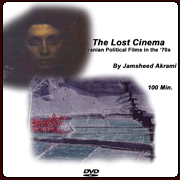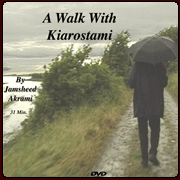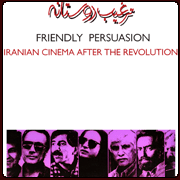
The Lost Cinema
This feature length documentary on Iranian cinema before the revolution, explores the key issues of the Iranian New Wave, a film movement which blossomed in the late sixties as a cinema of protest against a film industry dominated by the aesthetically crude, socially uninformed domestic films and excessive exhibition of popular Hollywood and European imports. In the wake of the Islamic Revolution of 1979, the New Wave films, along with all other pre-revolutionary films, were banned due to their non-conformity to the severely restrictive censorship codes imposed after the revolution.
Through analyzing selected films and a series of interviews with filmmakers and scholars, film professor Jamsheed Akrami, whose previous documentary, Friendly Persuasion, examined Iranian cinema after the revolution, sheds light on a significant trend of politically themed films made in the seventies that contributed to the political education of the Iranian middle class.

A Walk With Kiarostami
U. S.-based film professor Jamsheed Akrami talks to Iranian master Abbas Kiarostami in a spontaneous video interview, which offers a frank and funny view of Kiarosatami rarely seen before.
The interview was conducted over a span of two days during the Galway Film Fleadh in Ireland in 2003. In the first segment, on a ferry trip returning from Aran Islands where Robert Flaherty shot his classic Man of Aran, Kiarostami makes a few self effacing remarks and draws an amusing parallel between the dearth of women and scarcity of water in his films before he discusses transformation of reality in the process of framing in photography and film.
In the second part, shot on a rainy summer afternoon, Kiarostami is shown hard at work capturing the Irish landscapes of Galway with his still camera. The interview primarily focuses on Kiarostami's fascination with nature photography. He justifies his interest in working in several media as a restless attempt in countering his fear of inadequacy. Later in the piece, Mr. Kiarostami regrets not having enough hair to look more attractive in front of the camera.

Friendly Persuasion
Friendly Persuasion examines the critical issues of Iranian cinema by framing several key questions and providing informed responses through commentary, scene analysis, and interviews with top Iranian filmmakers. The questions focus on international flowering, censorship codes, film ratings, role of the government, representation of women, and a world-class children's film movement.
The filmmakers interviewed represent three generations of Iranian directors from new-wave visionaries (Abbas Kiarostami, Dariush Mehrjui, Bahram Bayzai, Masoud Kimiai) to post-revolutionaries (Mohsen Makhmalbaf, Rakhshan Bani Etemad, Ebraheem Hatami Kia) and the third generation (Majid Majidi, Jafar Panahi, Tahmineh Milani).
